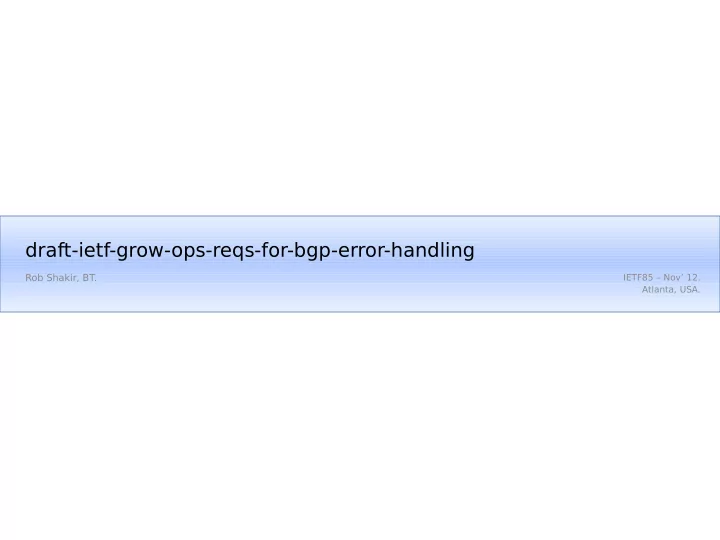

draft-ietf-grow-ops-reqs-for-bgp-error-handling Rob Shakir, BT. IETF85 – Nov’ 12. Atlanta, USA.
Open Issues from RtgDir Review and IETF Last Call (I). • Thanks to Chris Hall and Geoff Huston for detailed reviews. 1. How do we classify errors? Critical vs. Semantic - essentially, those that are length errors vs. those that are in – content (current draft) – rename to “Critical” vs. “Non-Critical”? – Critical/Serious/Ignorable/Recoverable – Essentially, length errors as above, and then some special treatment – are Ignorable and Recoverable are special cases requiring knowledge of the attribute? – PROPOSAL: Follow recommendation to rename to “non-critical” unless there are better suggestions. 2. How much detail of how to classify errors should the draft go to? – Current level: Overview of key considerations for Critical vs. Non-Critical – no detailed analysis of particular attributes. – Lower level: As discussed by Chris Hall – discussion down to what level of framing error is acceptable and how certain we need to be. PROPOSAL : Leave GROW draft as-is, and allow further detail in IDR draft (drat-ietf-idr-error- – handling).
Open Issues from RtgDir Review and IETF Last Call (II). 3. Analysis of existing behaviour (Section 3). – Is this required in the document? Potentially should be part of the problem statement. Historically motivating treat-as-withdraw being implemented wider than Optional T ransitive – only. This looks to be happening within draft-ietf-idr-error-handling. – – PROPOSAL : Follow suggestion and integrate this into the problem statement section – noting historical view 4. Operational Toolset section in the draft. – Note that this potentially is a scope creep. Should it be separate? – PROPOSAL : – Note criticality of addressing operational monitoring in parallel with changing procedures. – Recommend that it is kept within this draft – rather than spinning separate draft off. 7. Duplication of requirements/analysis between sections. Need to clarify wording, based on historical growth of the document – to be addressed – following discussion of above proposals.
Recommend
More recommend